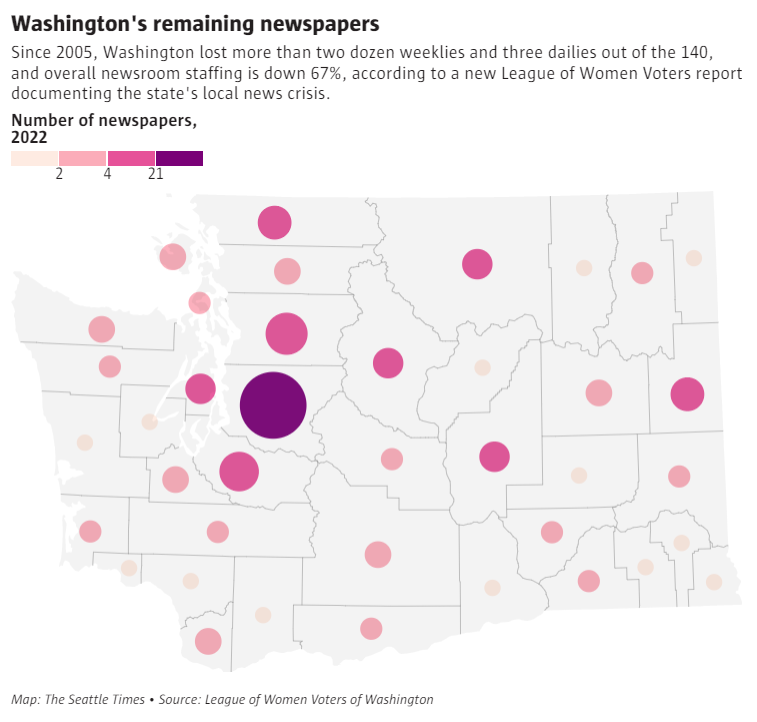This story was originally published by The Seattle Times.

Opinion
New study documents Washington’s local news and democracy crisis
Nov. 16, 2022 at 4:50 pm Updated Nov. 16, 2022 at 4:50 pm
By Brier Dudley, Seattle Times Free Press editor
A timely new report documents the severe decline of Washington’s local news industry and how democracy is suffering as a result.
The League of Women Voters of Washington produced the 133-page report because it’s concerned about how this crisis is affecting civic engagement, public health and even public finance, as research found government costs are higher where there’s no local journalism.
“Because of these very negative correlations, the League has a high level of interest in the health of journalism,” said Lunell Haught, a Spokane management consultant serving as president of the statewide nonprofit.
I hope the report is read widely by the public, educators and especially elected officials. The state’s federal delegation is already a leader in efforts to help save local journalism but a final push is needed to get these policies, such as the Journalism Competition and Preservation Act, done.
Several state-level proposals to help are expected in the upcoming Legislature, including an extension of tax breaks for newspaper producers and a journalism fellowship program modeled on one in California.
The League may opt to advocate for such policies but not until after its chapters review the report and its 2,400 members decide on a position at a conference in May.
In the interim, several of the authors said they hope it inspires leagues in other states to produce reports on the journalism crisis in their areas.
That would complement national research, such as The State of Local News report on news deserts by Northwestern University’s Medill School, which was a baseline for the League’s project.
Full disclosure: The League invited me to provide feedback as a technical editor as they drafted the report.
The report also highlights the service provided by ethnic media outlets, how public health suffers from the decline of local news and emerging models to sustain the business, such as philanthropies partnering with for-profit newspapers.

One of the lead authors, Delores Irwin, is a former journalist who moved from California to Ellensburg in 2015. She’s grateful for the Ellensburg Daily Record but watched it fade in recent years.
“It’s not exactly a ghost newspaper but it’s just a shadow of its former self — I can see it, to me the threat is real,” she said. “Now someone in Seattle, they see The Seattle Times, it’s not as obvious what’s happening. But if you live in a smaller community it’s right in front of your eyes, they’re cutting down the days they print, it’s just sad.”
Another lead author, Dee Anne Finken, is also a former journalist. She lives in Clark County, where she’s watched The Columbian thin but also pursue community support, enabling it to add three reporters.
Although Washington continues to have at least a weekly paper working in every county, that belies the extent of the problem, because the gutted industry produces far less reporting and has scant circulation in much of the state.
Newsroom staffing fell 67%, the report notes, as the industry was disrupted by technological change and Big Tech companies came to dominate the advertising marketplace.
“As is the case throughout the nation, the decline has meant Washington, too, is experiencing an explosion of mis- and disinformation, creating significant challenges for public health officials and others. Coverage of government agencies and elected officials in Washington has dropped significantly, as well,” the report states.
Consolidation and disinvestment by remote owners also took a toll, with debt-burdened chains slashing staff in cities like Tacoma, Olympia and Tri-Cities.
“In perhaps the most egregious case, the newsroom staff at The News Tribune in Tacoma, purchased a few years ago by a hedge fund, declined from more than 120 employees to just over more than two dozen,” it said.
Closures and cuts are especially felt in suburbs and rural areas.
“The weeklies that closed between 2004 and 2022 once served busy suburbs of Seattle, Tacoma and Everett and rural regions, including the counties of Adams, Ferry, Grant, Grays Harbor and Yakima,” the report said. “Some might wonder if the dailies filled in the coverage lost by the closure of those weeklies. But observers said all of the remaining dailies have lost significant staff and advertising, causing them to rein in their own primary coverage.”
Rowland Thompson, executive director of the Allied Daily Newspapers of Washington trade group, said it’s “very helpful” to have the industry’s situation documented by an impartial group.
“Having the League of Women Voters doing this study and advocating on behalf of journalists is heartening. and it will make a difference to legislators to see that and also read the report,” he said.
Haught said she hopes the public as well as league members read the report, as the goal is to educate people about something that’s critical to civic engagement.
Survival of democracy was a top concern in last week’s election, with 44% of voters saying it was their primary consideration, according to a national survey by The Associated Press.
I suggest voters with those concerns, and those skeptical of them, read the league’s report so we can advance the conversation.
With luck, 2022 may come to be seen as a turning point that prompted America to start pulling together, rise from a trough, and save its essential institutions.
Brier Dudley on Twitter: @BrierDudley. is editor of The Seattle Times Save the Free Press Initiative. Its weekly newsletter: https://st.news/FreePressNewsletter. Reach him at bdudley@seattletimes.com
